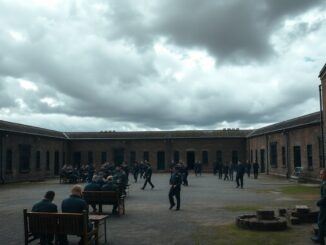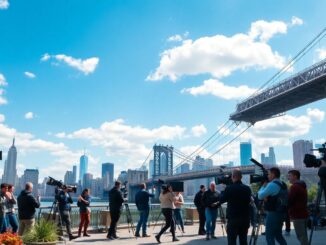As protests escalate in Los Angeles, Major General Sherman clarifies the National Guard's role amidst rising tensions and public outrage.

Topics covered
Protests erupt across Los Angeles as demonstrators voice their outrage against President Trump’s immigration policies. The situation intensifies with the deployment of the National Guard to the area, raising questions about the military’s role in civil unrest. Major General Scott Sherman confirmed that while National Guard troops are trained to detain civilians, no such actions have yet been taken.
Protests ignite in response to immigration raids
Starting last Friday, the streets of Los Angeles have been flooded with protesters decrying recent immigration raids targeting businesses in Southern California. These actions, part of Trump’s aggressive deportation strategy, have sparked outrage and mobilized thousands.
Major General Sherman, addressing the media, assured that the troops are prepared for potential unrest, stating, “We are expecting a ramp-up in national unrest in the coming days.” The National Guard’s presence has not quelled tensions; instead, it has added fuel to the fire.
Escalating military presence
Since the National Guard’s arrival, the situation has escalated further. Sherman indicated that 500 out of the 4,000 troops deployed have received specialized training to assist Immigration and Customs Enforcement (ICE). This raises alarms among local officials, including Los Angeles Mayor Karen Bass, who condemned the federal decision to send troops without state consent. “This is a drastic and chaotic escalation and completely unnecessary,” Bass asserted, reflecting the growing local resentment towards federal intervention.
Governor Gavin Newsom has taken action, filing an emergency motion to restrict Trump’s military presence in the city. Newsom and Bass both argue that local law enforcement was effectively managing the protests before federal troops were deployed. The military’s involvement, they claim, has only incited further unrest. Bass’s comments resonate with many local leaders, who question the federal government’s motives: “Are we part of a national experiment to see how far federal power can reach?”
President Trump maintains that the deployment of troops is necessary to protect federal property and agents. However, he has yet to invoke the Insurrection Act, which would allow military personnel to engage in domestic law enforcement directly. Until such action is taken, the National Guard is generally barred from making arrests. This has led to confusion and concern over the military’s role in civilian matters.
Immigration raids intensify
Despite the ongoing protests, the Trump administration remains committed to its aggressive immigration strategy. Officials have set a quota of 3,000 arrests per day, leading to increased tensions within immigrant communities. Reports indicate that ICE agents are adopting increasingly aggressive tactics, targeting individuals without documentation, regardless of their legal history or community ties. This has resulted in blanket raids in public spaces, such as Home Depot, where undocumented workers often seek employment.
Community response and resilience
Amid the unrest, many workers continue to show up, despite the risk of detention. They communicate covertly to avoid ICE agents, showcasing their determination to find work. The resilience of these communities has been evident, as they adapt to the new reality of fear and uncertainty. “These are people who are communicating by WhatsApp and other methods,” reported journalist Phil Lavelle, underscoring the lengths individuals will go to survive.
Trump’s controversial rhetoric
Trump has characterized the protests as a “full-blown assault on peace” and an “invasion” of the United States. This inflammatory language has only deepened divisions and heightened tensions. In a congressional hearing, General Dan Caine contradicted Trump’s claims of invasion, stating, “I don’t see any foreign state-sponsored folks invading, but I’ll be mindful of the fact that there have been some border issues.” This dissonance between military perspectives and presidential rhetoric highlights the complexities of the current situation.
A volatile future
As tensions in Los Angeles continue to rise, the situation remains fluid. The presence of National Guard troops, coupled with ongoing protests, raises pressing questions about civil liberties and the role of the military in domestic matters. With local leaders pushing back against federal authority, the coming days may see further developments. The community’s resilience and response to these challenges will undoubtedly shape the narrative moving forward.




